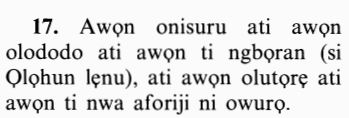3vs17
Select any filter and click on Go! to see results
الصَّابِرِينَ وَالصَّادِقِينَ وَالْقَانِتِينَ وَالْمُنفِقِينَ وَالْمُسْتَغْفِرِينَ بِالأَسْحَارِ
Alssabireena waalssadiqeena waalqaniteena waalmunfiqeena waalmustaghfireena bialashari
Click to play
Yoruba Translation

Hausa Translation
Mãsu haƙuri, da mãsu gaskiya, da mãsu ƙanƙan da kai, da mãsu ciyarwa da mãsu istingifari a lõkutan asuba.
Asbabu n-Nuzuul (Occasions of Revelation)
.الصَّابِرِينَ ...
(They are) those who are patient,
while performing acts of obedience and abandoning the prohibitions.
... وَالصَّادِقِينَ ...
those who are true,
concerning their proclamation of faith, by performing the difficult deeds.
... وَالْقَانِتِينَ ...
and obedient,
meaning, they submit and obey Allah,
... وَالْمُنفِقِينَ ...
those who spend,
from their wealth on all the acts of obedience they were commanded, being kind to kith and kin, helping the needy, and comforting the destitute.
... وَالْمُسْتَغْفِرِينَ بِالأَسْحَارِ ﴿١٧﴾
and those who pray and beg Allah's pardon in the last hours of the night.
and this testifies to the virtue of seeking Allah's forgiveness in the latter part of the night.
It was reported that when Yaqub said to his children, سَوْفَ أَسْتَغْفِرُ لَكُمْ رَبِّيَ (I will ask my Lord for forgiveness for you) (12:98) he waited until the latter part of the night to say his supplication.
Furthermore, the Two Sahihs, the Musnad and Sunan collections recorded through several Companions that the Messenger of Allah said,
يَنْزِلُ اللهُ تَبَارَكَ وَتَعَالى فِي كُلِّ لَيْلَةٍ إِلى سَمَاءِ الدُّنْيَا حِينَ يَبْقَى ثُلُثُ اللَّيْلِ الْآخِرُ، فَيَقُولُ:
هَلْ مِنْ سَائِلٍ فَأُعْطِيَهُ ؟
هَلْ مِنْ دَاعٍ فَأَسْتَجِيبَ لَهُ ؟
هَلْ مِنْ مُسْتَغْفِرٍ فَأَغْفِرَ لَهُ ؟
Every night, when the last third of it remains, our Lord, the Blessed, the Superior, descends to the lowest heaven saying,
"Is there anyone to ask Me, so that I may grant him his request?
Is there anyone to invoke Me, so that I may respond to his invocation?
Is there anyone seeking My forgiveness, so that I may forgive him?''
The Two Sahihs recorded that Aishah said,
"The Messenger of Allah performed Witr during the first part, the middle and latter parts of the night. Then, later (in his life), he would perform it (only) during the latter part.''
Abdullah bin Umar used to pray during the night and would ask,
"O Nafi! Is it the latter part of the night yet?''
and if Nafi said, "Yes,'' Ibn Umar would start supplicating to Allah and seeking His forgiveness until dawn.
This Hadith was collected by Ibn Abi Hatim.
ثم قال تعالى " الصابرين " أي في قيامهم بالطاعات وتركهم المحرمات " والصادقين " فيما أخبروا به من إيمانهم بما يلتزمونه من الأعمال الشاقة " والقانتين " والقنوت الطاعة والخضوع " والمنفقين " أي من أموالهم في جميع ما أمروا به من الطاعات وصلة الأرحام والقرابات وسد الخلات ومواساة ذوي الحاجات " والمستغفرين بالأسحار " دل على فضيلة الاستغفار وقت الأسحار وقد قيل : إن يعقوب عليه السلام لما قال لبنيه " سوف أستغفر لكم ربي" أنه أخرهم إلى وقت السحر . وثبت في الصحيحين وغيرهما من المسانيد والسنن من غير وجه من جماعة من الصحابة أن رسول الله صلى الله تعالى عليه وعلى آله وسلم قال " ينزل الله تبارك وتعالى في كل ليلة إلى السماء الدنيا حين يبقى ثلث الليل الأخير فيقول : هل من سائل فأعطيه ؟ هل من داع فأستجيب له ؟ هل من مستغفر فأغفر له ؟ " الحديث . وقد أفرد الحافظ أبو الحسن الدارقطني في ذلك جزءا على حدة فرواه من طرق متعددة . وفي الصحيحين عن عائشة رضي الله عنها قالت : من كل الليل قد أوتر رسول الله صلى الله صلى الله عليه وسلم من أوله وأوسطه وآخره فانتهى وتره إلى السحر. وكان عبد الله بن عمر يصلي من الليل ثم يقول : يا نافع هل جاء السحر ؟ فإذا قال : نعم أقبل على الدعاء والاستغفار حتى يصبح رواه ابن أبي حاتم . وقال ابن جرير : حدثنا ابن وكيع حدثنا أبي عن حريث بن أبي مطر عن إبراهيم بن حاطب عن أبيه قال : سمعت رجلا في السحر في ناحية المسجد وهو يقول : يا رب أمرتني فأطعتك وهذا السحر فاغفر لي فنظرت فإذا هو ابن مسعود رضي الله عنه . وروى ابن مردويه عن أنس بن مالك قال : كنا نؤمر إذا صلينا من الليل أن نستغفر في آخر السحر سبعين مرة .
"الصابرين" على الطاعة وعن المعصية نعت "والصادقين" في الإيمان "والقانتين" المطيعين لله "والمنفقين" المتصدقين " والمستغفرين" الله بأن يقولوا اللهم اغفر لنا "بالأسحار" أواخر الليل خصت بالذكر لأنها وقت الغفلة ولذة النوم .
يعني عن المعاصي والشهوات , وقيل : على الطاعات .
I'raab - grammatical analysis of the Qur'an
«الصَّابِرِينَ» بدل من الذين مجرور بالياء لأنه جمع مذكر سالم أو اسم منصوب على المدح بفعل محذوف والأسماء.
«الصَّادِقِينَ وَالْقانِتِينَ وَالْمُنْفِقِينَ وَالْمُسْتَغْفِرِينَ» عطف على الصابرين.
«بِالْأَسْحارِ» متعلقان بالمستغفرين.
